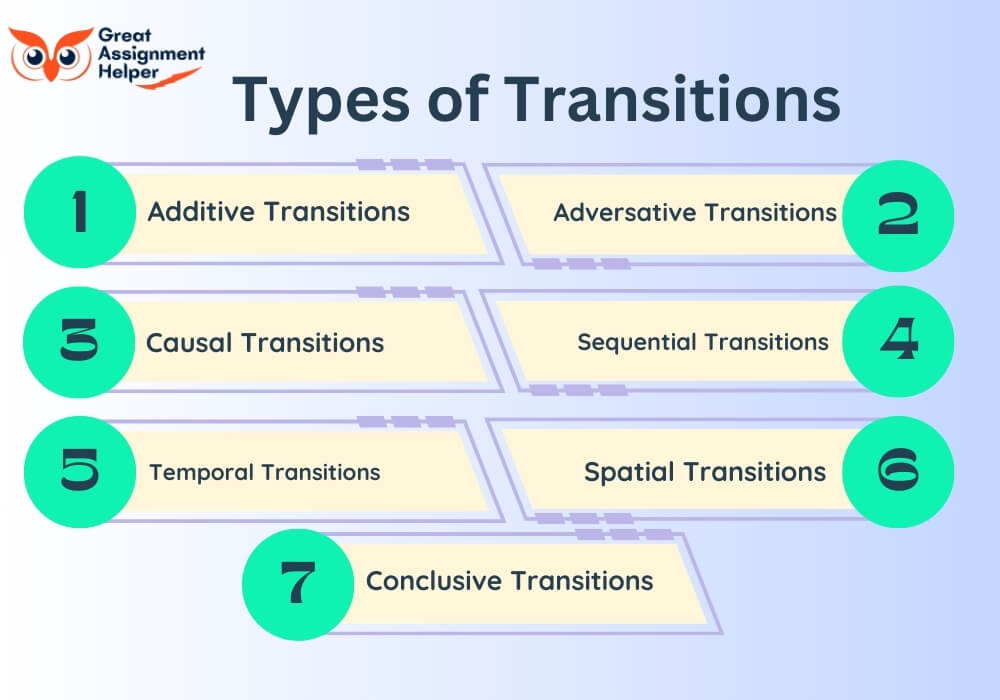
Listen To This Blog
Introduction
When crafting an essay, the seamless integration of ideas and arguments is crucial for engaging and persuading your reader. This is where transition words become invaluable. These linguistic tools are the building blocks that connect your thoughts coherently, guiding your readers through the narrative or argument you're presenting. Transition words for essays are more than just linguistic flourishes; they are essential elements that help bridge ideas, provide clarity, and enhance the overall readability of your writing. Whether you're a student aiming to score higher on your assignments or a writer looking to refine your style, understanding and effectively using transition words can significantly elevate the quality of your essays.
What are Transition Words?
Transition words are the linguistic threads that connect different ideas in an essay, ensuring a smooth flow and logical progression of thoughts. They are pivotal in structuring your writing, guiding the reader through the narrative or argument. These words act as bridges, linking sentences and paragraphs in a way that maintains the coherence and direction of the essay. By using transition words effectively, you can enhance the readability of your content, making complex ideas more accessible and understandable. They are not just mere connectors; they add depth and clarity, helping to illustrate relationships between points and reinforcing the argument or narrative. For any writer, mastering the use of transition words is a key skill in crafting compelling and persuasive essays.
Types of Transitions

Transitions in writing are not one-size-fits-all; they come in various forms to serve different purposes in your essay. Understanding these types can greatly enhance the effectiveness and clarity of your writing. Here are some key types of transitions:
- Additive Transitions: These are used to add or introduce information. They help in reinforcing points and presenting new ideas. Examples include words like "furthermore," "moreover," and "in addition."
- Adversative Transitions: These transitions are employed to show contrast, disagreement, or concession. They are crucial in presenting alternative viewpoints or acknowledging opposing arguments. Words such as "however," "on the contrary," and "nevertheless" fall under this category.
- Causal Transitions: To establish a cause-and-effect relationship between ideas, causal transitions are used. They are key in explaining the reasons behind an occurrence or the impact of something. Phrases like "as a result," "therefore," and "thus" are commonly used.
- Sequential Transitions: These are used to show a sequence of events or a step-by-step process. They help in organizing arguments or ideas in a logical order. Examples include "firstly," "subsequently," and "finally."
- Temporal Transitions: When indicating the timing of events, temporal transitions are your go-to. They are useful in narrative essays where the timing of events is crucial. Words like "before," "after," and "during" are typical examples.
- Spatial Transitions: These transitions describe the physical location or position of something. They are often used in descriptive essays. Phrases like "above," "below," and "adjacent to" are examples.
- Conclusive Transitions: Used to summarize or conclude discussions, these transitions are essential in bringing an essay to a cohesive end. They include "in conclusion," "to sum up," and "in summary."
Each type of transition serves a unique purpose in essay writing, helping to weave a more structured, coherent, and persuasive narrative. By skillfully incorporating these transitional words for essay, writers can effectively guide their readers through the flow of their ideas.
Categories of Transition Words
Good Transition words for essays are categorized based on their function in the text, each serving a specific purpose to enhance the clarity and coherence of writing. Here are five primary categories:
- Illustrative Transitions: These transitions are used for illustrating or adding examples. They help in making arguments more concrete by providing evidence or examples. Common words in this category include "for instance," "for example," and "such as."
- Comparative Transitions: Essential in essays that involve comparison or contrast, these transitions highlight similarities or differences between ideas. Words like "similarly," "on the other hand," and "contrarily" are often used.
- Conclusive Transitions: These are used to summarize or conclude a discussion. They are key in wrapping up an essay or a section of it. Phrases such as "in conclusion," "to summarize," and "overall" are typical examples.
- Clarification Transitions: When the goal is to clarify or explain an idea further, clarification transitions come into play. They are useful in making complex ideas more understandable. Words like "in other words," "to clarify," and "that is to say" are often employed.
- Concession Transitions: These transitions acknowledge opposing viewpoints or arguments while still standing by the original point. They are crucial in argumentative essays for presenting a balanced view. Examples include "admittedly," "even though," and "despite this."
Each category plays a vital role in structuring an essay and enhancing the flow of information. By effectively using these transition words, writers can guide their readers through their arguments and narratives in a clear and logical manner.
List of Transition Words for Essays
Transition words are pivotal in crafting well-structured and coherent essays. Here's a concise list to enhance your writing:
Transition Words for Agreement, Addition, or Similarity
While writing an argumentative essay or any other college essay, the transition words listed below will be helpful to you. These words are ideal for expressing agreement, adding information, or highlighting similarity in your writing:
- In addition to
- Equally important
- Again
- Therefore
- Let alone
- Just like
- As a matter of fact
- Also
- Not only… but also
- In the same fashion
- Too
- In the light of
- By the same token
- Moreover
- In the same way
- Even More
- Indeed
- Similarly
- In like manner
- Comparatively
- As well as
- Not to mention
- And
- Another
- Furthermore
- Correspondingly
- Thus
- Equally
- Likewise
- Including
These transition words are effective in seamlessly connecting thoughts and reinforcing points, making your essay more coherent and persuasive. They help in building a strong argument by linking ideas and emphasizing the addition of information or the presence of similarities.
Transition Words for Sequence or Order
- Firstly, secondly, thirdly
- Initially, subsequently, finally
- Previously, currently, eventually
- In the first place, following that, lastly
- At first, next, before concluding
- To begin with, then, in conclusion
- In the beginning, afterward, to end
- First and foremost, following this, to wrap up
- To start, later on, in the final analysis
- Initially, moreover, in summary
Transition Words for Compare and Contrast Essay
- However
- On the other hand
- Conversely
- While
- In contrast
- Unlike
- Similarly
- Just as
- Likewise
- In the same way
- Equally
- As well as
- Yet
- Nevertheless
- Although
- Even though
- On the contrary
- In comparison
- Alternatively
- Despite
- Whereas
- Nonetheless
- In spite of
- Compared to
- On one hand... on the other hand
Transition Words for Informative Essay
- Specifically
- For instance
- In particular
- Such as
- Including
- Namely
- To illustrate
- For example
- As an illustration
- Especially
- Notably
- Particularly
- To explain
- To clarify
- In detail
- Mainly
- This can be seen in
- As demonstrated by
- To put it another way
- In other words
Transition Words for Examples, Emphasis, or Support
- For example
- For instance
- To illustrate
- In particular
- Specifically
- Such as
- Namely
- Consider
- As evidence
- To demonstrate
- Indeed
- In fact
- Actually
- Essentially
- Importantly
- Notably
- Particularly
- Above all
- Especially
- Significantly
Transition Words for Location, Time, Space/Place
- Above
- Below
- Beside
- Nearby
- Adjacent to
- Opposite
- Here
- There
- Everywhere
- Within
- Outside
- Across
- Beyond
- Alongside
- Between
- Before
- After
- During
- Meanwhile
- Subsequently
- Finally
- Initially
- Previously
- Currently
- Later
- Soon
- Immediately
- Eventually
- Temporarily
- Permanently
Transition Words for Conclusion, Summary, or Clarification
- In conclusion
- To summarize
- Ultimately
- Finally
- In summary
- To conclude
- In brief
- Overall
- Thus
- Therefore
- As a result
- Consequently
- In essence
- To clarify
- In other words
- Put simply
- To put it differently
- In short
- All in all
- In the final analysis
- To wrap it up
- In the end
- Summing up
- After all
- In a nutshell
Where to Use Transition Words in an Essay?
Transition words for argumentative essay are essential tools in essay writing, serving as bridges between ideas and sections. Here are some key places to use them:
Transition Words to Start a Paragraph:
These words are crucial at the beginning of a new paragraph. They signal a shift in topic or a step forward in the argument. Examples include "Furthermore," "In addition to," and "Moreover." These words help in smoothly transitioning from one idea to the next, maintaining the flow of the essay.
Conclusion Transition Words:
When wrapping up an essay, conclusion transition words are vital. They help in summarizing the main points and signaling the end of the discussion. Phrases like "In conclusion," "To sum up," and "Ultimately" provide a clear end to your narrative, allowing the reader to understand that the essay is drawing to a close.
Good Transition Words for Overall Flow:
Throughout the essay, good transition words enhance the overall flow and coherence. Words such as "However," "Similarly," and "Consequently" are used to show contrast, comparison, or cause-effect relationships. They are instrumental in guiding the reader through the progression of your thoughts and arguments.
Incorporating these transition words appropriately ensures that your essay is well-structured and easy to follow. They not only connect ideas within the essay but also help in maintaining a consistent tone and style throughout your writing. Transition words are the subtle threads that weave your ideas into a cohesive whole, making your essay more readable and effective.
Wrapping Up
In conclusion, understanding and effectively using transition words is a fundamental aspect of essay writing. These linguistic tools not only enhance the coherence and flow of your essays but also significantly improve their overall quality. For students and writers seeking additional essay help, Great Assignment Helper stands out as a reliable online assignment help service provider. Their expertise can guide you in mastering the art of essay writing, ensuring that your work is not just well-structured but also compelling and clear. Remember, a well-crafted essay is a blend of clear ideas, logical structure, and seamless transitions, all of which can be achieved with the right guidance and practice.
Read More Blogs: Learn How to Write a Counter Argument Paragraph

